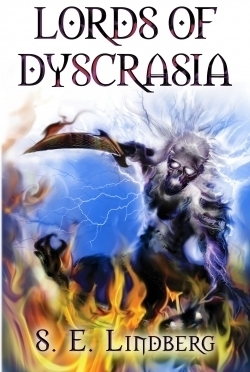Lords of Dyscrasia
Diary, I tallied the Dissection Theater’s subjects again.
So begins the debut novel of Massachusetts native and chemist-by-day Seth Lindberg. This decidedly dark fantasy is heavily influenced by Dante, Poe, Lovecraft, and a great love for weird tales.
Opening the novel is the narrator, Dey, a seer and the stepson of Endenken Lysis. Endenken’s father, the leader of Clan Lysis, has recently died. In fact, much of Dey’s and Endenken’s world is dying. Humans and gods (both insectoid and avian) are infected with dyscrasia, a blood disease that is fatal to all who contract it. Endenken’s ancestors, the Picti, endeavored to save their gods through a complicated ritual that allows the Lysis clan to bear descendants who may eventually find a cure for dyscrasia. However, nothing is that simple. In the process of conducting the rite to pass his clan’s powers onto him, Endenken rejects his inheritance in favor of saving his wife and finding a way to end the blood plague.
Outside of the works of Poe and Lovecraft, there are few, if any, novels comparable to this one. It has a bardic tone, as if it was a tale told over many nights. Beowulf comes to mind both for its epic quality and bloody action.
Imagery shifts from mundane to surreal in the same paragraph. The pace is nearly breathless, though it never feels forced. Lindberg’s love of the English language and his admiration for Dante in particular are obvious on every page. The melancholic dread that Poe and Lovecraft were so skilled at creating is matched—and at times exceeded—in Lindberg’s prose: “I stared upward at a skull and heap of bones. I knew only the soul of a man spoke to me, and that astral, red warmth emanated from the charnel pile. A woman’s skeleton lay near—her hands gauntleted with insectan claws belonging to some eldritch creature and her head helmeted with a gargantuan bird skull, much like my own.”
Apart from a rather obsessive attachment to the words eldritch and ichor, Lords of Dyscrasia is carefully crafted and fits well into the weird-fiction canon. Given that Poe and Lovecraft have been dead for decades and still remain popular, Lindberg’s novel should find a ready-made audience in readers of the macabre and strange.
Lindberg, who also created more than fifty illustrations and the cover for this book, makes the majority of current popular fantasy fiction read like recipes by comparison. Lords of Dyscrasia is highly recommended, though not for the faint of heart.
Reviewed by
J. G. Stinson
Disclosure: This article is not an endorsement, but a review. The publisher of this book provided free copies of the book and paid a small fee to have their book reviewed by a professional reviewer. Foreword Reviews and Clarion Reviews make no guarantee that the publisher will receive a positive review. Foreword Magazine, Inc. is disclosing this in accordance with the Federal Trade Commission’s 16 CFR, Part 255.

